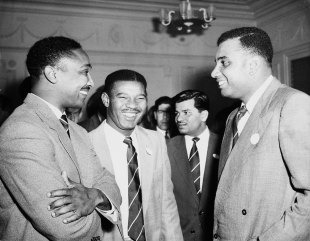T&T honours the legacy of the three W's
The legacy of Frank Worrell, Clyde Walcott and Everton Weekes was celebrated at the Queen's Park Oval
Roger Seepersad
10-Apr-2008

| ||
The debut of the Three Ws-Sir Frank Worrell, Clyde Walcott and Sir Everton Weekes - some 60 years ago changed the face of West Indies cricket forever. That history was celebrated on Tuesday night at the Queen's Park Oval Banquet Hall in the presence of the last surviving member, Sir Everton Weekes.
Worrell made his Test debut in 1948, at the Oval, against England. The match marked the start of the Three Ws era, and was also Andy Ganteaume's lone Test appearance. Though the Trinidad and Tobago batsman made 112, he was never again selected on the regional team.
Three perspectives on the life of Worrell and the 1948 Test match were presented at Tuesday's function. Deryck Murray gave a player's take on Worrell, Tony Cozier delivered a journalist's point of view and Professor Courtney Bartholomew presented a personal perspective.
All three speakers agreed that his contribution to West Indies cricket went "well beyond the boundary".
Murray described the 1948 Test as unique since it was Ganteaume's first and last appearance. He said Ganteaume's unfortunate situation will remain one of the defining moments of the era.
Murray praised Ganteaume for the way he carried himself after being dropped after becoming the first West Indies batsman to make a century on debut, in the first innings of the Oval Test. The T&T board president said Ganteaume was "still able to contribute, and further the cause of West Indies cricket."
Murray recalled the first time he played under the captaincy of Worrell. "In Sir Frank Worrell we had a man who became accepted as the elder statesman of West Indies cricket...a unifying force. He was all things to all men. I understood how little the significance of insularity could be if you wanted to be part of a team. He insisted that room-mates could not be from the same territory, he insisted that there was an older and younger roommate so that at all times the team administration was about learning, mentorship and becoming a representative of a truly West Indian team in the true sense of the word. I have no hesitation in saying that Sir Frank Worrell was the greatest leader that world cricket has ever seen and probably even beyond that."
Cozier looked back at Worrell's career. "Here is a man who, through cricket and from quite humble beginnings in Barbados, was knighted in 1964, the second West Indian cricketer to be knighted, was a senator in Jamaica, and when he died he was honoured by a Memorial Service in Westminster Abbey, the only cricketer to be so honoured.
"It was here at the Queen's Park Oval," Cozier continued, "a 17-year-old school boy, batting No. 11 and considered a left-arm spin bowler, came onto the scene playing for Barbados. He moved up the order, and in 1946 he and Walcott put on an unbeaten partnership of 574 of which Worrell had 255 not out and Walcott 314 not out. "Sir Everton Weekes," Cozier noted, "was out for a duck, but he more than made up for it in subsequent innings at the Oval."

| ||
In the feature address, Bartholomew was high in praise for the Three Ws.
"It was all for one and one for all," he declared, noting that when Weekes was out for a duck at the Oval, Worrell and Walcott made up for it. It is a good thing that God made night or else Worrell and Walcott would still be at the crease."
Bartholomew also spoke about Worrell's captaincy on the tour of Australia in 1960-61. At the end of the tour there was a ticker-tape farewell for the team, with 200,000 people lining the streets of Melbourne chanting "We want Frank". West Indies lost the series 2-1 but featured in the first-ever tied Test. "We won the hearts of everyone in Australia and indeed the world."
In 1963, West Indies toured England and were again very popular. On that occasion, West Indies won the series 3-1. Worrell retired after the series, and died in 1967.
The day before he died, Bartholomew recalled, Worrell told the nurses, "'Please remove the drips ... I am tired, very tired'. And so, the captain declared his innings retired hurt, before he reached his half-century, at the age of 42. The king is dead, long live the king. It was the worst of times."
Bartholomew thanked the Sir Frank Worrell Memorial Committee for keeping the "memory of the King alive ... it was the best of times." Weekes and Ganteaume were presented with memorial plaques.